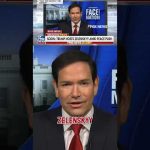In a bold move that has sparked both enthusiasm and criticism, the President is taking significant steps to enhance safety in Washington D.C. After a dinner with numerous National Guard and law enforcement officers, where he dished out slices of pizza and juicy burgers, the President vowed to tackle crime head-on. This strategic gathering signals a commitment to fortifying security in the nation’s capital, a place that has often been in the spotlight for its public safety challenges.
The President’s visit came after a notable police intervention aimed at reducing crime rates. He emphasized that this intervention is just the beginning of a comprehensive plan to restore order. In fact, he promised a physical transformation of the city itself, claiming that in just six months to a year, citizens would be proud of a beautifully revamped D.C. With promises of new surfaces and attractive medians, the enthusiasm for the makeover is palpable, all while maintaining a focus on public safety.
While many supporters see the President’s actions as crucial, there are critics who argue against the urgency of a federal takeover of the city. Some dissenters, including local officials, contend that crime in D.C. was already on a downward trend prior to the federal surge. The President, however, dismissed these claims as “false and highly inaccurate.” His firm stance indicates a determination to enact policies he believes are essential, regardless of opposition.
A former National Guardsman highlighted the importance of the President’s acknowledgment of the troops. Sharing meals with those on duty doesn’t just provide a morale boost; it demonstrates engagement from the Commander-in-Chief. This connection can significantly enhance morale and even assist with recruitment, fostering a sense of camaraderie among those who serve. The acknowledgment of law enforcement’s role in maintaining order resonates well with those who feel underappreciated in their challenging work.
Interestingly, discussions have emerged about whether similar interventions should target other high-crime cities across the nation. Political experts pointed out that the execution of such plans requires cooperation from state governors. If the governor is supportive, the National Guard can be called up easily. However, in places where local leaders are less receptive, invoking the Insurrection Act becomes a necessary and politically charged step. This challenge reflects a broader dilemma as cities grapple with effective law enforcement strategies.
The critics on the left have been vocal in their opposition, often labeling the President’s initiatives as authoritarian. However, some observers believe this reaction stems from a deeper partisanship—anything associated with the President is perceived as negative. This reaction raises questions about the left’s policies on crime, particularly their approach to policing and prosecution. Critics argue that leniency in these areas has not only perpetuated criminal activity but has also contrasted starkly with the administration’s proactive strategies to ensure public safety.
As this situation unfolds, the nation watches closely. Will the President’s intervention bring about the promised transformation in public safety and the physical landscape of D.C.? Only time will tell, but one thing is clear—there’s a renewed focus on making the capital, and by extension, the nation, a safer place to live. The stakes are high, and the road ahead may be paved with both challenges and triumphs.




